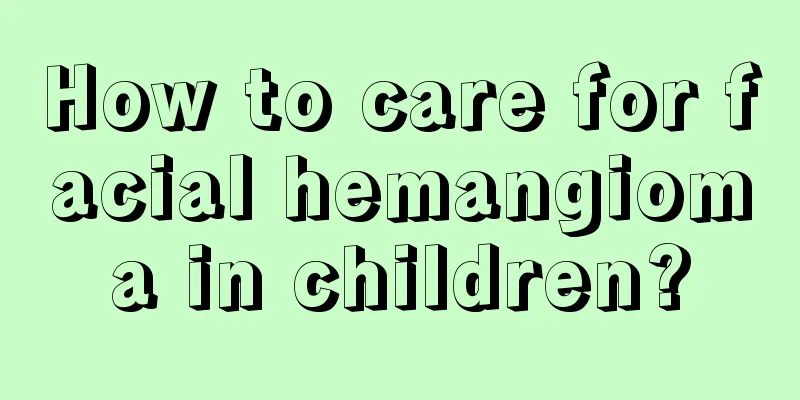Why does my child always stick out his tongue?

|
In real life, many parents will find that their babies often stick out their tongues during their growth period. There are many reasons why babies stick out their tongues. Generally, this is a normal phenomenon. Babies will slowly learn some skills after birth. Sticking out the tongue is a common phenomenon. Excessive saliva or saliva secretion that stimulates the mouth can easily cause the baby to stick out his tongue. Why do children always stick out their tongues?When did you start to stick out your tongue? Newborn babies rarely stick out their tongues. Generally speaking, babies start sticking out their tongues around 3 or 4 months after birth. Some babies start doing it even earlier, at around 2 months old. In fact, for babies at this age, sticking out the tongue is just like playing with toys. As the objects of their interest gradually increase and shift, they will not play the game so frequently. Reasons why babies stick out their tongue 1. Indicates that the baby is healthy If the baby's tongue tie is too short, it cannot extend beyond the lips and will have a lisp when speaking in the future. Therefore, when you see your baby sticking out his tongue at you frequently, it means that in addition to his ability to explore the world with his tongue, his tongue is also developing very quickly and healthily. 2. Natural stages of physiological development The baby's salivary glands will begin to secrete saliva two months after birth. At this time, the baby will lick with the tongue, and then will stick out the tongue. So mothers don’t need to worry too much, sticking out the tongue is a normal phenomenon before the age of one. 3. It is the baby's way to explore the world After the baby is born, the order of body movement development is from beginning to end. At the beginning, he uses his mouth to bite, his tongue to lick, etc. to touch and understand the world. Therefore, babies will suck from the moment they are born and will put things in their mouths at any time, especially their own fingers. Sucking and licking, it's like exploring the world. Different occasions, different needs1. When feeding your baby with a bottle When you are feeding your cute baby, their tongue sticking out means that there is enough food in their mouth, or they are full and don't want to drink any more milk. Of course, in addition to sticking out the tongue, other ways babies show they are full include yawning, crying, pushing the nipple away, etc. Mothers must understand these actions, because eating too much can lead to obesity, so it is important to understand what the baby means when he sticks out his tongue. 2. Before feeding your baby When mothers have just made milk powder in the bottle and have not had time to feed their children, if the babies stick out their tongues, it does not mean that they are full. On the contrary, it means that they are hungry and sticking out their tongues means asking you for food. As for how to tell whether the baby sticks out his tongue because he is full or hungry, there are ways to do so. If you see your little one sticking out their tongue and tilting their head while you're feeding, that means they're full. But if you see them eagerly sticking out their tongue and reaching for you, that means your baby is hungry. 3. When the baby is playing As a father or mother, you will find that babies especially like to play with you and will imitate your facial expressions. The little ones will find this a fun game. At this time, if the baby sticks out his tongue, it means he wants to play a game with you and he is waiting for your response. At this time, mothers can kiss your baby, which will make him feel extremely happy. So, play more games with your children. This can enhance the relationship between you and your little one and make you closer.
Although many experts recommend starting solid foods at 6 months old, many children are not ready. If your baby sticks out his tongue when you start giving him solid food, it's a natural reaction to prevent choking. If you notice this reaction, then you should understand that your child is not ready to accept solid food yet and it will take some time for him to do so. 5. Other time periods Generally speaking, it's not a big deal when a baby sticks out their tongue. However, if tongue sticking out is accompanied by drooling and difficulty eating, it means that the child cannot control the muscles needed to swallow. At this time, you need to consult a professional pediatrician to help solve this defect of your baby. |
<<: One-month-old baby always struggles when sleeping
>>: Why do babies keep waking up during sleep?
Recommend
What are the treatments for hernia in children?
Hernia in children generally refers to the appear...
How to treat tooth decay in children
Teeth are very important to us, and tooth protect...
How to deal with the hard lumps where babies get injections?
In the process of treating various diseases, infa...
Which department should children with bed-wetting go to?
It is common sense that you need to go to a depar...
Is self-adhesive wallpaper harmful to children?
Wallpaper is one of the most important materials ...
Newborn baby autumn and winter clothing guide
As the saying goes, cover yourself in spring and ...
Will neonatal jaundice cause drowsiness?
Neonatal jaundice is mainly divided into physiolo...
Treatment of upper respiratory tract infections in children
In fact, the air conditions are not very good now...
What are the causes of indigestion in infants?
We all know that the baby's digestive ability...
Why does my baby sleep restlessly in the second half of the night?
The biggest feeling of mothers after having a bab...
Why do babies like to touch their ears?
Babies usually like to touch their ears. This is ...
Things to note when newborns swim, mothers should know
The most fun time after a baby is born is swimmin...
Can children undergo gastroscopy?
The physical health of children is the most impor...
Causes and treatments for a 40-degree fever in a child
Next, we will introduce to you the causes and met...
What are the symptoms of neonatal encephalopathy during recovery?
Generally speaking, the symptoms of neonatal ence...









